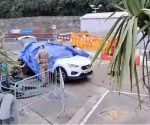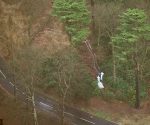“Former soldier” in suicide day after Panorama accusations of SAS murder; media sitting on further details?
Whatever the reason for it in the grander scheme of things, the BBC’s Panorama this week aired an investigation that was untypically antagonistic to the UK’s military. The Ministry of Defence called the programme irresponsible insinuation that “puts our brave Armed Forces personnel at risk both in the field and reputationally”. The matter for the offence was a new raking over old coals, and the death of civilians as they were being held on suspicion of being combatants by the SAS on “kill or capture” missions in Afghanistan. The Panorama programme, aired on Tuesday night, essentially accused a unit of special forces of committing murder of innocents who were incriminated by having weapons planted on their premises so that they could be deemed a threat, and “justifiably” eliminated, as per the scope of the operation as specified by its name. The Ministry of Defence was also essentially accused of tolerating a cover-up by SAS officers, and staging a lip-service investigation whereby evidence could not be found of any wrongdoing.
The argument that various Armed Forces and Ministry personnel have proffered in rebuttal is that the BBC programme offers no new evidence that would change the previous findings, and because the Army is honourable and brave, when it investigates itself then it wouldn’t lie, and in any case, saying beastly things about the Army would somehow make it weaker, which means that accusers of the Army are quite obviously agents of Putin.
Yes, indeed. Although the Ministry of Defence didn’t say the exact line as it appears above, it basically appealed to its own image of do-gooder – the one carefully marketed since the Second World War that has no basis in any truth. And although Boris Johnson may have told the Commons in relation to the Panorama programme that no one serving in Her Majesty’s Armed Forces is above the law, this would be a lie, because it is as clear as day versus night that the intelligence elements of the armed services (which comprises the real UK Government in an amalgam with the City of London) work to their own agenda, with the civilian government front legislating as required, and civilian law enforcement covering up the crime committed to manipulate the people so as to accept the governance.
UK military in its intelligence capacity – which would incorporate the SAS – is what is called in these pages, the British Krypteia, based on the model of ancient Greece, which means it is a secret army that terrorises and murders its “own” people as if they were a conquered population to keep them subjugated. This is the conclusion that the author has come to by looking at terror attacks and high profile crimes that couldn’t have been perpetrated by the people accused of them, but must nevertheless have been perpetrated by someone. Because the motive for these crimes is always to create a pretext for change according to government agenda, and because means and opportunity are never a problem for resource rich UK military intelligence, the real culprit can be deduced.
Of course, the conduct of the SAS in Afghanistan – the author does not doubt that the allegations are true – is as one would expect for a Krypteia at work, with a variation devised to suit the subjugation of another type of conquered population that is quite different from the method used in Britain, which has a veneer of rule of law, which again is quite different from the method that has been used in Ireland, where sectarian tensions and their over spilling to disrupt normal civilisation shaped operations. Indeed, if one has heard of atrocities committed by the British Army in a foreign land, and in most places that it has been stationed (at the moment, the Ukraine is feeling the brunt of its experience), it is because the British Krypteia has been in existence for a long time (a Victorian invention, the author suspects), but let us be clear, in all that time, no other country has been as plagued by them than Britain herself.
There is every intention to produce a piece that looks at the extent to which the Ministry of Defence has covered up SAS murder squads in Afghanistan, and this will be in support of the Krypteia deduction (because here is activity by which SAS conduct remains hidden), and although in fact what has here been written would suit it for an introduction, this piece must instead be primarily concerned with an incident that happened so coincidentally with the broadcast of the Panorama programme that there should be interest in it as if it could be directly related.
The basic story is that, in the evening (local time) of 13th July (when still morning in the UK), a British man went to a shooting range in Pattaya, Thailand, hired two guns, one of which was a Glock 9mm pistol, hired enough ammunition to suggest that he had no other interest but to shoot, and then let off at least 10 shots into his targets. It was then, as evidently witnessed by others in the range, that he put his gun to his head and shot himself.
A link between the man and the UK armed forces was established via an identity card evidently found upon his person, in the way described in the extracts the reader will find below – and note, the failure to report the fact of the word “veteran” also on the card. This is pertinent because if one looks at id card samples on line, there are some for veterans organisations, and they differentiate themselves with this additional word. So, because the two UK corporate-media outlets, The Sun, and the MailOnline, that reported this incident on the day of its occurrence do not give any detail whatsoever which would make the man’s being a veteran a certain fact, it is noteworthy that they both insist as early as the headline that he was a former soldier. The extracts reproduced below suggest that both versions of the story are variations of the same press release, and very likely came down to content writers with the same information, and the instruction that the man was a veteran:
Paramedics who arrived at the scene found the soldier on the floor gasping for air in a pool of blood.
He was rushed to the nearest hospital in the Banglamung district, but died later in the evening.
Police are now interviewing staff and other witnesses who were at the range at the same time as the soldier.
He was carrying an ID card that ‘The British Army’ printed on it and staff said he had visited the range around six times before.
Manager Santat Senkhor, 33, said: ‘I am still in shock after what happened. The British person was a regular customer who has been to the shooting range about five or six times.
‘Today, he rented two types of firearms, a short gun and a long gun, and bought 25 rounds of ammunition, which I didn’t think was unusual. There were no signs of any abnormality and I served him as usual.
Paramedics who arrived at the scene found him on the floor gasping for breath.
He was rushed to the nearest hospital in the Banglamung district but died later in the evening.
Police are now interviewing staff and other witnesses who were at the range at the same time as him.
He was reportedly carrying an ID card that had “The British Army” printed on it and staff said he had visited the range around six times before.
Manager Santat Senkhor, 33, said: “I am still in shock after what happened.
“The British person was a regular customer who has been to the shooting range about five or six times.
“Today, he rented two types of firearms, a short gun and a long gun, and bought 25 rounds of ammunition, which I didn’t think was unusual.
“There were no signs of any abnormality and I served him as usual.”
In a further development, on 14th July, a local outlet, the Pattaya Mail, named the man, and did it in a fascinating way:
Identified only as “XXX XXXXXX”, the 36-year-old was carrying an identification card stating he was a former British army soldier.
The reader will notice, of course, that the name has not been published, and this is for a reason to be explained momentarily. For discussion first is how this constitutes a statement of the man’s veteran status in a stronger way, but then one wonders what is going on with the quotation marks around the name. An immediate explanation that springs to mind is that it is necessary when a supposed veterans card printed with that name is the only form of ID to be found – but this is surely not realistic, especially if the man was known to the range manager, who might even need to record the personal details of people using the facility. So, of course, one looks out for the follow up – only to discover that what little there is only muddies the water.
On this day, 16th July, another local outlet, the Pattaya Today, reports that the man was indeed actively serving in the British Army, and indicated that Thai police were still not in a position to release a name. That being said, the piece is apparently unreliably dated, and seems to have been written on 14th July (because it makes a note of the date of the day previous to writing); it’s possible it was produced slightly ahead of the Pattaya Mail piece and another in an outlet called The Thaiger, which also gives the same name, so that these could carry the latest information. Still, because it is clear that UK authorities must know who this individual is (The Sun quoted a Foreign Office spokesperson saying: “We are in contact with the local authorities following the death of a British man in Pattaya, Thailand”), but have not yet made this information public, this site won’t invite obvious and otherwise all to easily avoided trouble for itself†.
Of course, even if this person was a serving soldier, it still doesn’t necessarily explain what clearly looks like prevarication in releasing further information, as if there was a good deal of sensitivity regarding the incident. It is now three days later, and how unlikely is it that next of kin have not yet been informed. (In fact, at 36, this individual’s next of kin could be a wife in Pattaya). And as a matter establishing what to expect, consider some historical cases for contrast.
Firstly, Christopher Laidler fell from a hotel balcony in Pattaya (there’s a lot of this, apparently) on 14th April, 2017. The Scottish Sun reported the incident and the name of the Briton on the same day, posting an image Thai police had released of a passport. On 16th April, Sky News reported that the Foreign Office confirmed that it was “providing assistance to the family of a British national who has sadly died in Thailand”, but evidently hadn’t officially been given Laidler’s name, because this was learnt from the Bangkok Post.
In another example, on 24th January, 2017, the BBC reported the death by shooting of a Briton in Pattaya that had happened earlier the same day:
Tony Kenway, originally from Southampton, was killed in a car park in the resort of Pattaya at 14:10 local time, according to the Bangkok Post.
The Foreign and Commonwealth Office (FCO) has confirmed it is in contact with local police regarding the death of a British national.
If this latest dead man is a serving solider, and if information is being sat on (by Thai police as a request by UK Government, or perhaps more likely, by UK Government in its relationship with media) – cause for suspicion of which has just been shown – then a central issue of this story is the same kind of denial of public oversight by which UK Government can maintain a Krypteia. The military has no right to operational secrecy by default. Indeed, a standing army is not even to be tolerated by a free society.
Whatever is going on in this case, there’s one thing to understand, and that this incident can’t help be linked to the Panorama programme by dint of the all too coincidental timing – and this applies whether the individual was an actively serving soldier (an officer, one might presume), or a veteran: at 36, it is quite feasible that this individual served in Afghanistan at the end of the first decade of the 21st century. Now, quite clearly also, this is not a substantial connection, but it is a starting point for thinking about this incident that irresistibly suggests itself. On top of that, of course, is the apparent failure by those who can and are able in the UK to disclose information – and while, admittedly, if this person is a private individual, a lack of resolution in the corporate-media doesn’t need to necessarily concern us, it does, however, when there is this all too much of a coincidence, and prima facie linkage, of the morning suicide of a person, surely having been a British soldier ten years ago, and the evening-before Panorama programme making terrible and very serious accusations of his ilk from that time.
† Update, 1st August, 2022:
At the time of this update, it can be assumed that those who needed to be informed of Ian Joseph’s death have been. That this might not have been done is what the concern about publishing the name amounted to. It should be noted that the internet has been devoid of further information about the incident since the initial reporting discussed here.


















